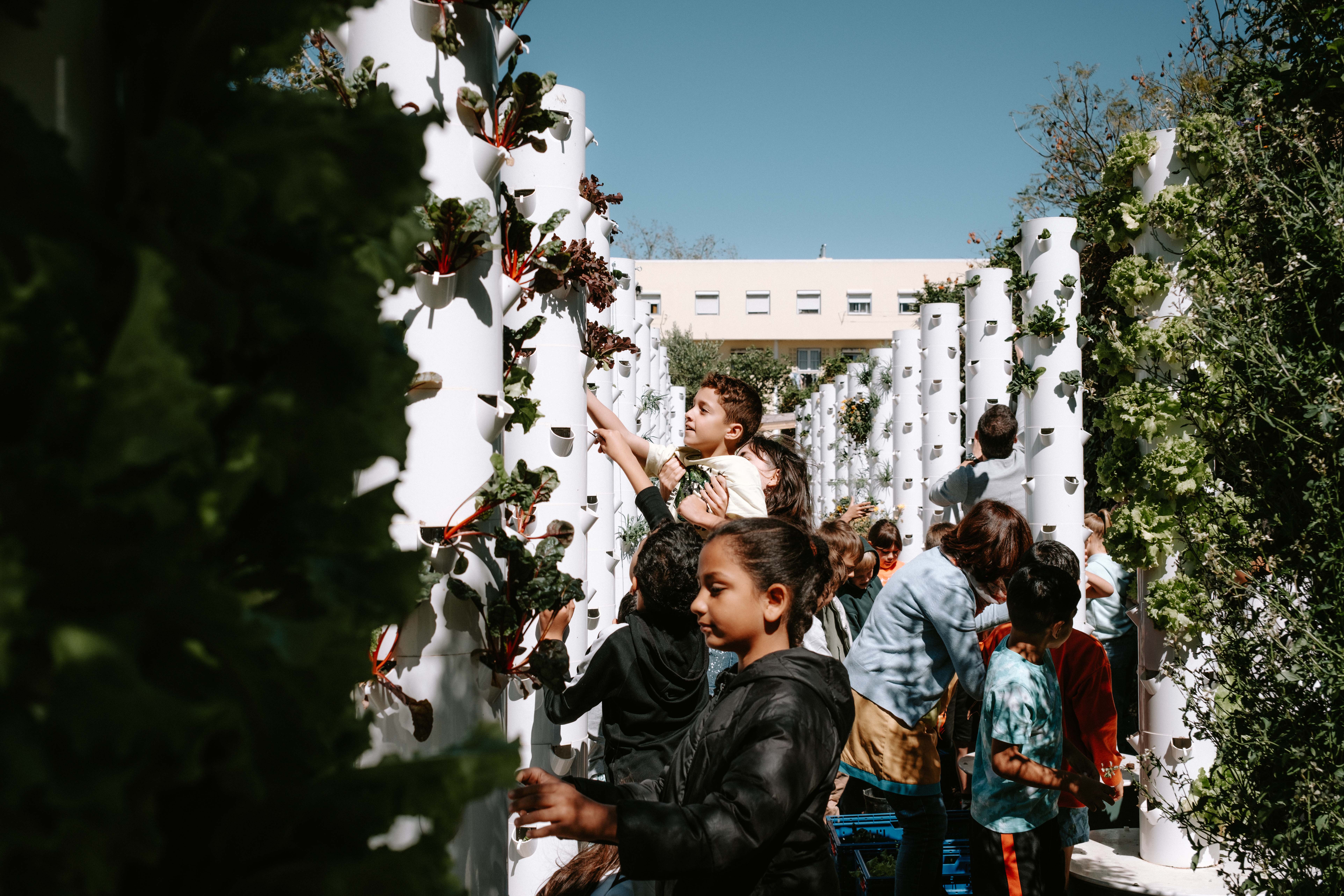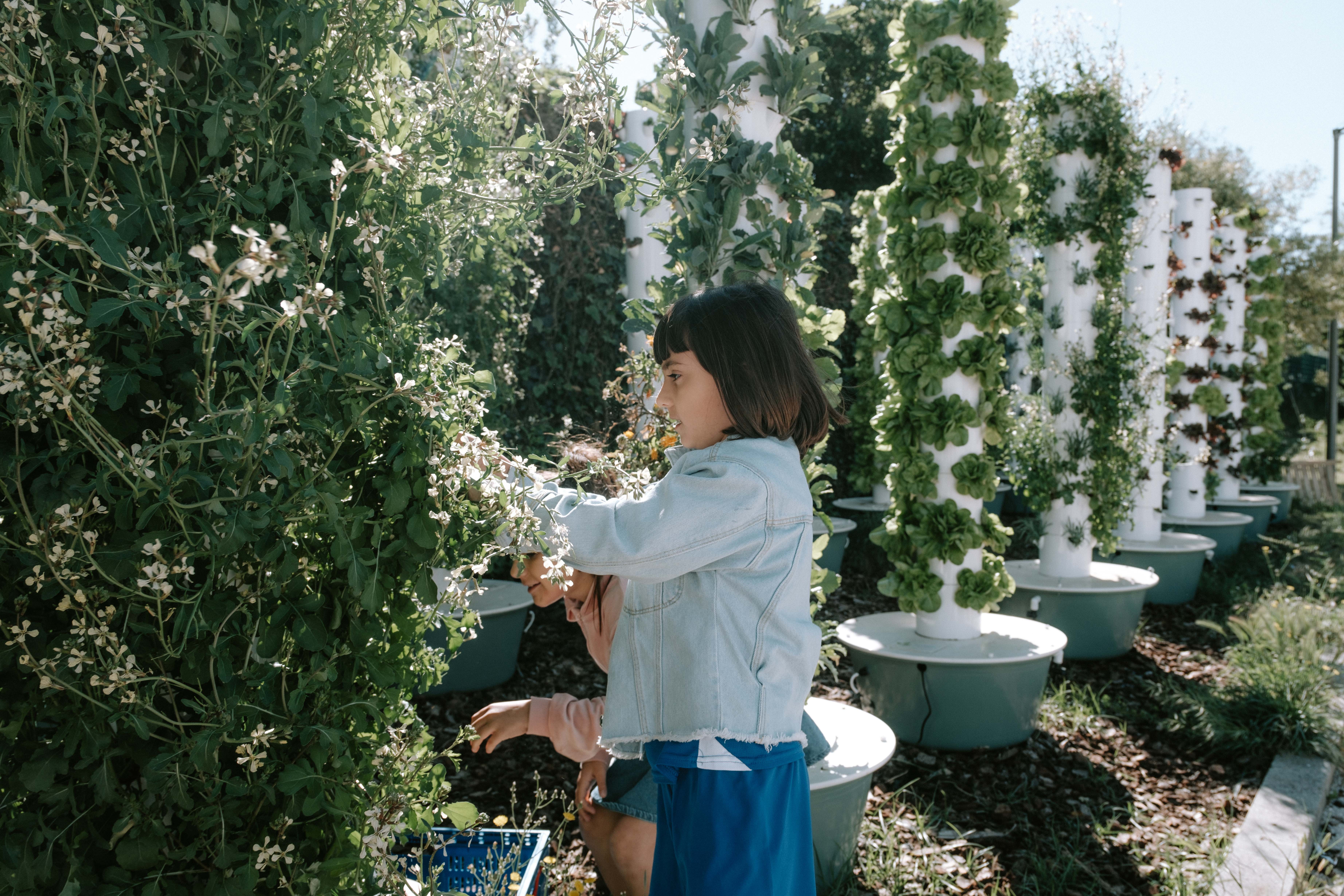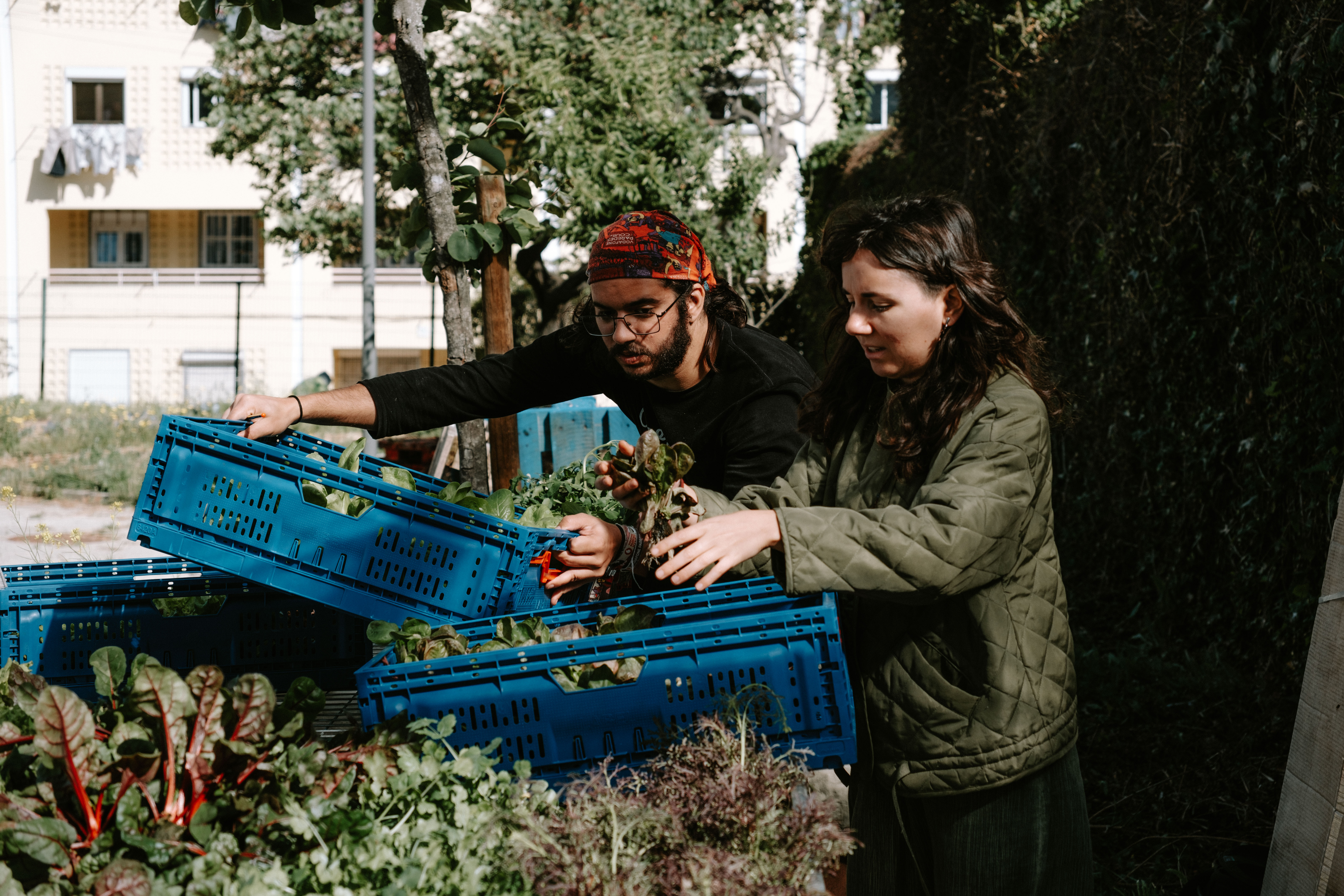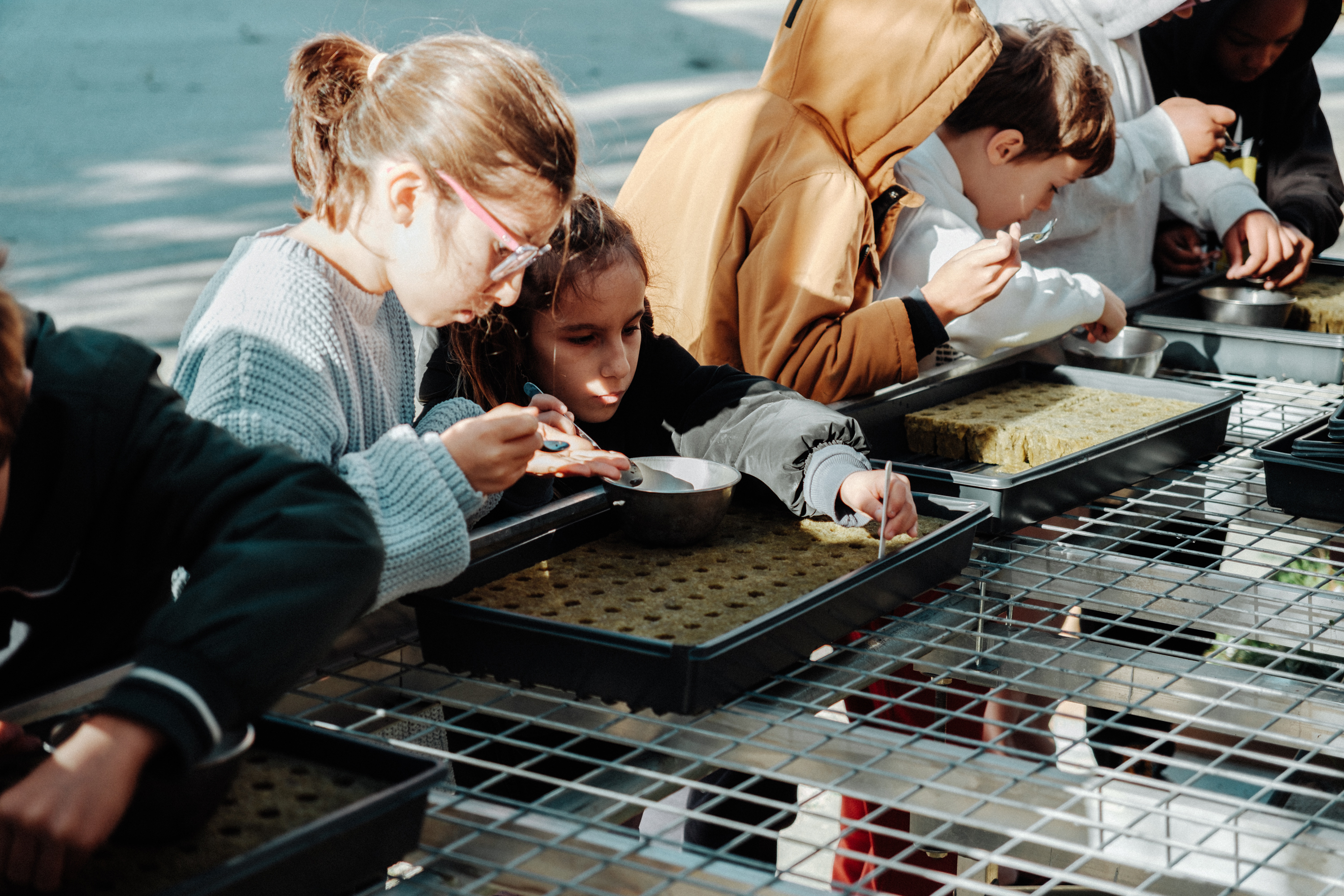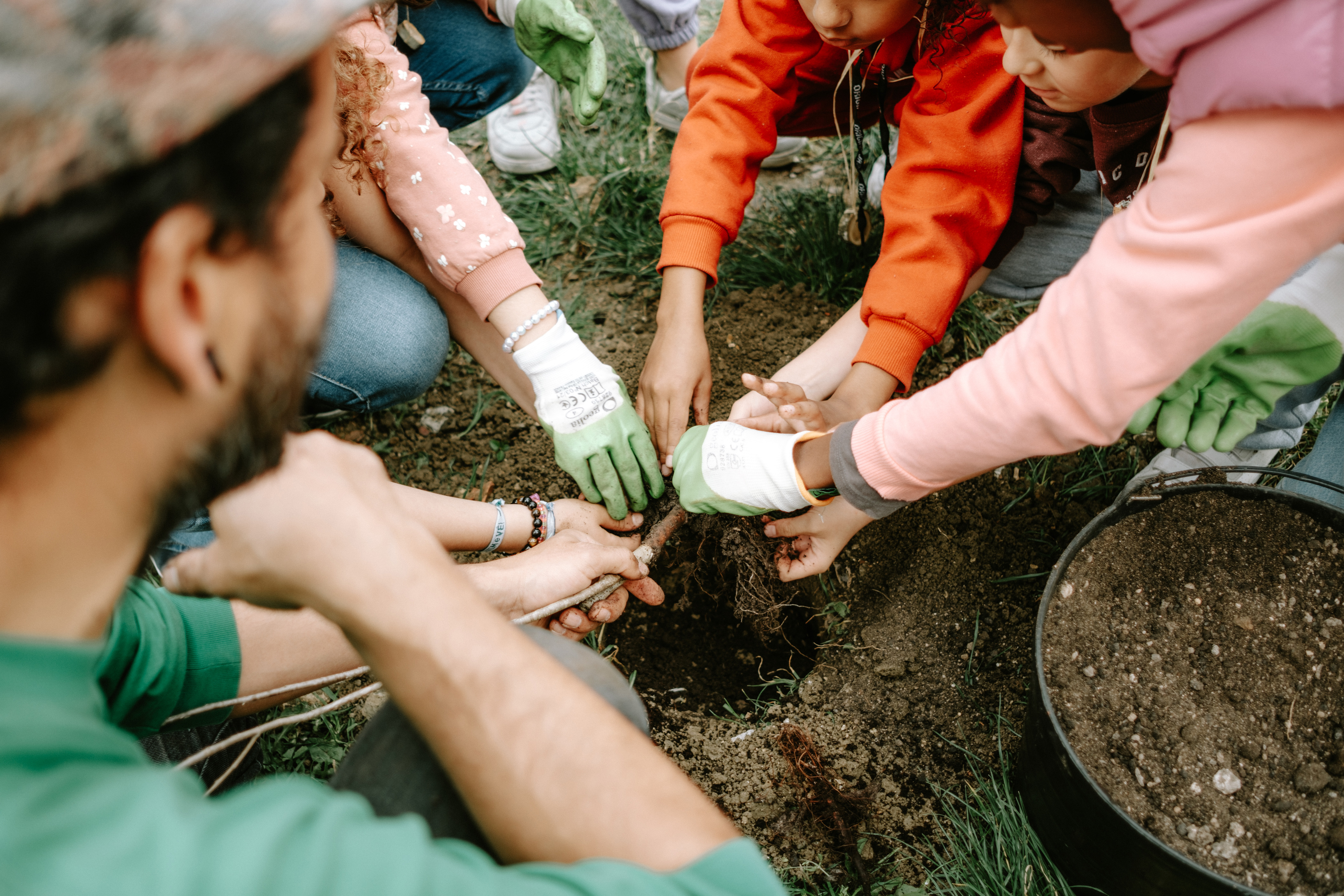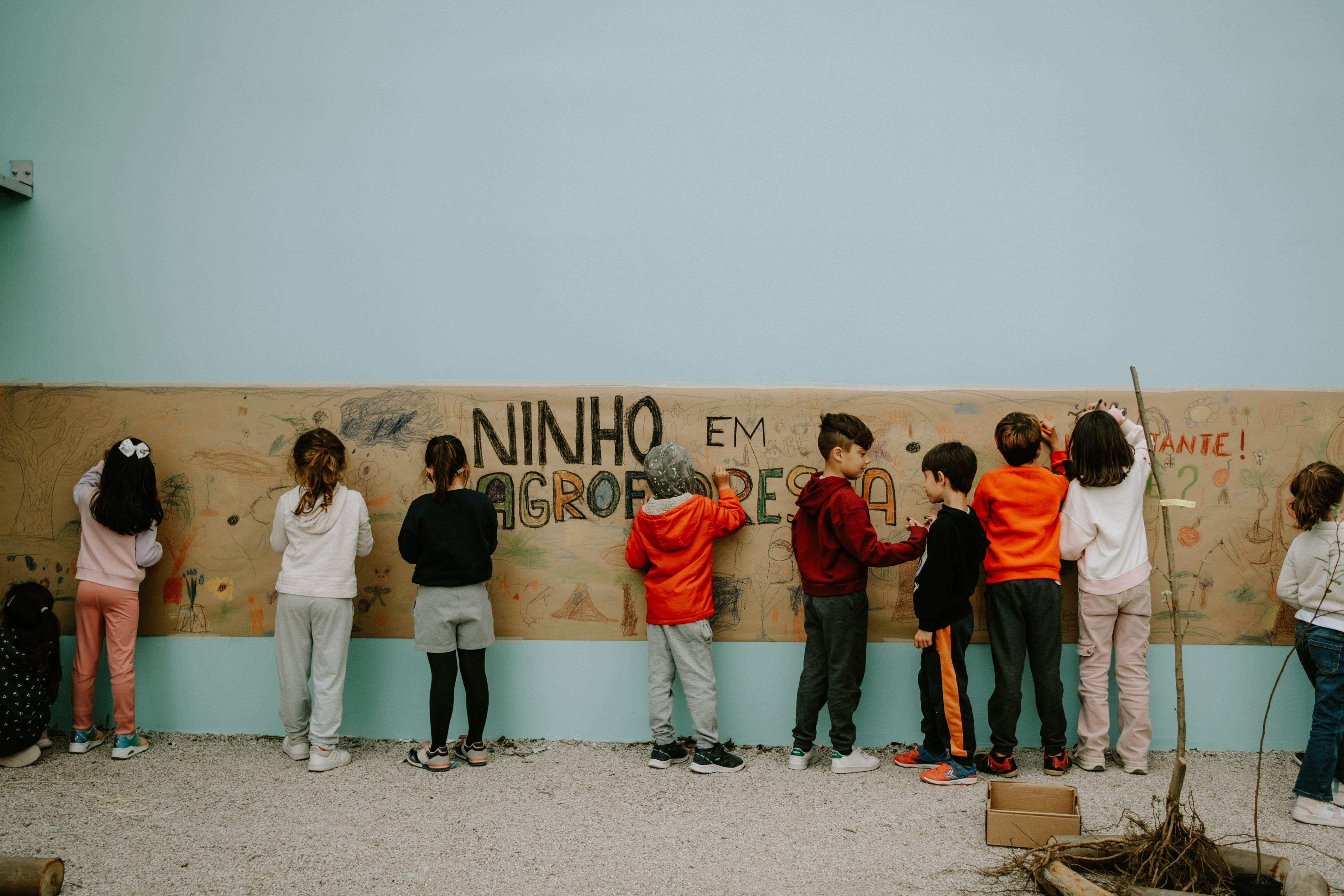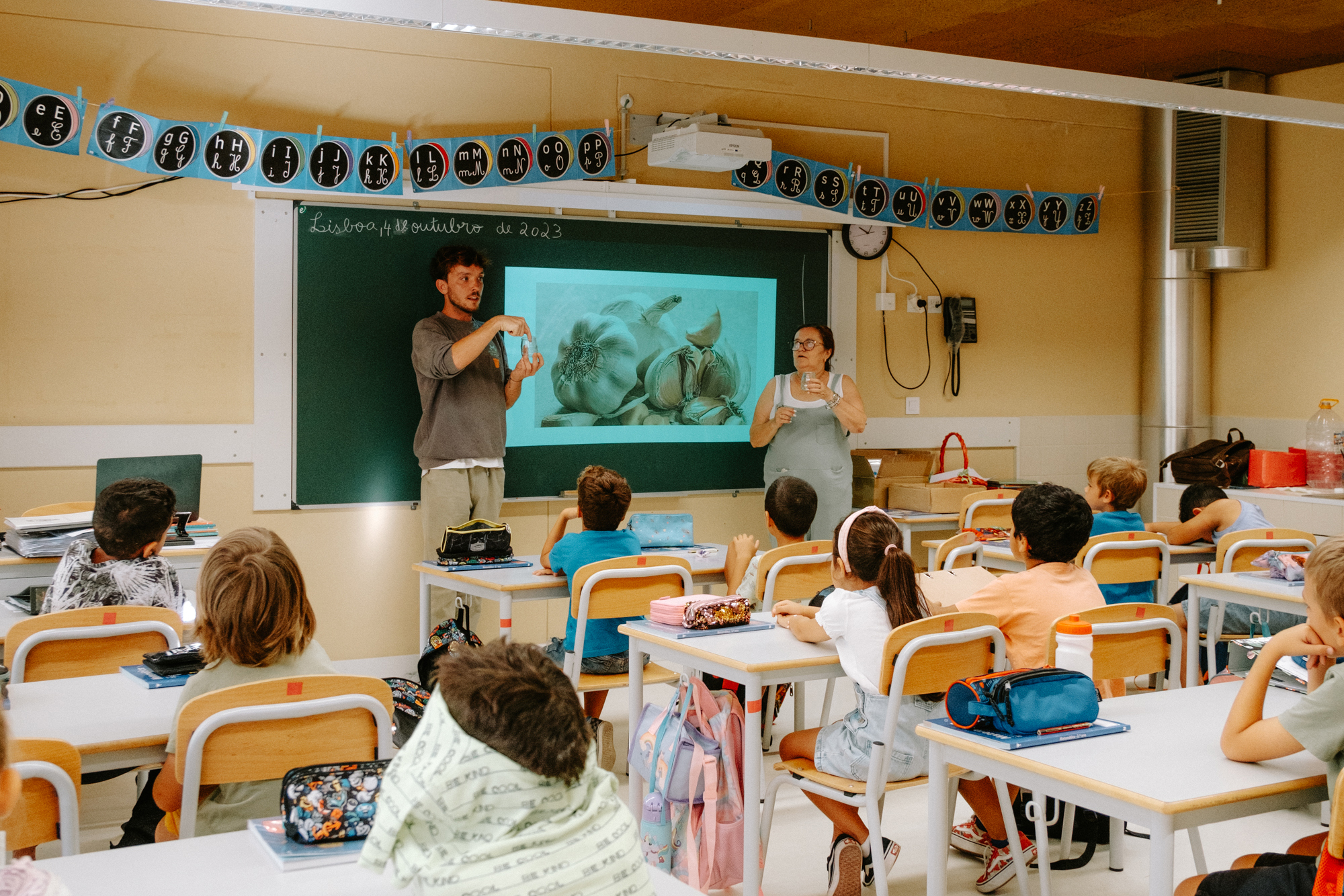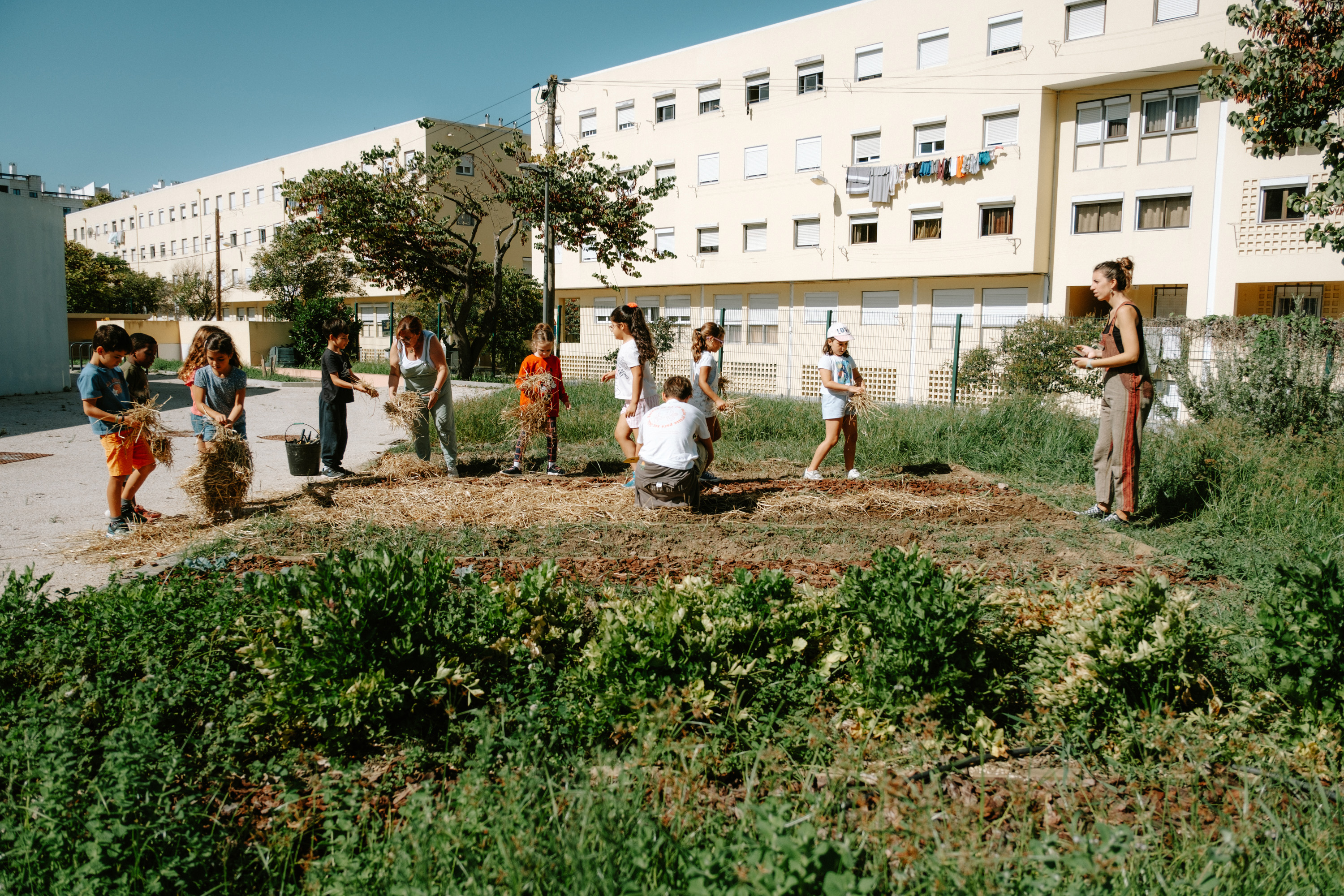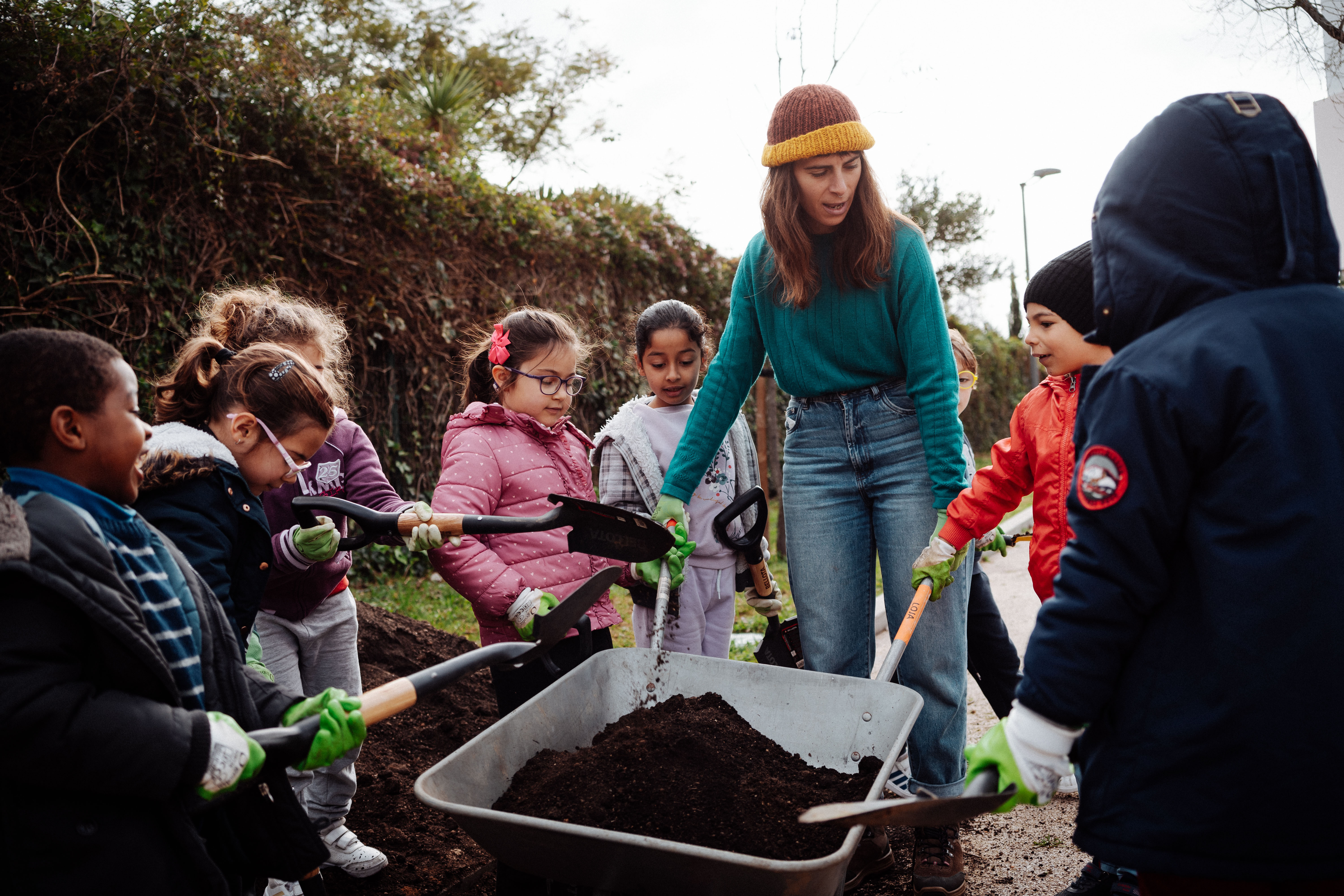Reconnecting with nature
The Edible School
The Edible School: Transforming Education through Food and Ecology
The Edible School project transforms the school into a living ecosystem focused on food, ecology, and responsible consumption. By integrating vertical farming, permaculture, agroforestry, and composting, it offers playful outdoor learning that fosters food literacy and environmental awareness within the school community. This innovative model inspires healthier habits, nurtures curiosity, and drives meaningful change toward a more sustainable, equitable future through education.
Portugal
Local
Lisbon
Mainly urban
It refers to a physical transformation of the built environment (hard investment)
Yes
2024-10-31
No
No
No
As a representative of an organisation
The Edible School Project is transforming a state primary school in Lisbon into an interactive ecosystem where students learn through direct engagement with food production and sustainability practices.
Our overall aim is to reconnect children with nature, promote environmental awareness and encourage healthier eating habits through hands-on learning. By integrating urban agriculture into the school day, we create a dynamic educational model that promotes both academic and personal development.
Students and school staff are the main target group, but families, local residents and food-insecure communities are also involved through joint activities and food distribution initiatives.Our specific objectives include:
- Implement a holistic urban agriculture system with agroforestry, a permaculture garden, a vertical farm, and a composter to support hands-on learning and sustainable food production
- Transform education by turning the outdoors into a living classroom, where the urban agriculture system becomes a dynamic learning tool, integrating the school curriculum through real-world experiences
- Empower teachers with training and tools to integrate environmental education
- Strengthen community ties by involving families and local organisations.
- Improve food security by distributing locally grown products to the school canteen, local food banks and school markets
Through this model, the school becomes a center for sustainability and social impact, inspiring a wider shift towards responsible consumption and environmental awareness.
Our overall aim is to reconnect children with nature, promote environmental awareness and encourage healthier eating habits through hands-on learning. By integrating urban agriculture into the school day, we create a dynamic educational model that promotes both academic and personal development.
Students and school staff are the main target group, but families, local residents and food-insecure communities are also involved through joint activities and food distribution initiatives.Our specific objectives include:
- Implement a holistic urban agriculture system with agroforestry, a permaculture garden, a vertical farm, and a composter to support hands-on learning and sustainable food production
- Transform education by turning the outdoors into a living classroom, where the urban agriculture system becomes a dynamic learning tool, integrating the school curriculum through real-world experiences
- Empower teachers with training and tools to integrate environmental education
- Strengthen community ties by involving families and local organisations.
- Improve food security by distributing locally grown products to the school canteen, local food banks and school markets
Through this model, the school becomes a center for sustainability and social impact, inspiring a wider shift towards responsible consumption and environmental awareness.
Food Literacy
Ecology
Community
Agriculture
Education
Sustainability is a core principle of the Edible School Project, where we integrate environmental, social, and economic dimensions to build a holistic, circular urban agriculture system - one that we as an organisation are constantly striving to improve.
Environmental Sustainability:
The project optimises space and resources through a diverse, closed-loop food system combining vertical farming, permaculture gardens, and agroforestry. The vertical farm’s aeroponic towers reduce water use by 90%, maximize yield in limited space, and eliminate soil degradation. The permaculture gardens restore soil health and promote biodiversity, while the agroforestry area integrates fruit trees and edible perennials, enhancing resilience and air quality. A composting system reintegrates food and plant waste into the soil, closing the nutrient cycle and reducing landfill waste. By producing food locally, the project minimizes transport emissions and supports a zero-kilometer food model.
Social Sustainability:
The project educates students through hands-on food production, fostering environmental awareness and healthy eating habits. This knowledge extends to families, shifting consumption patterns and strengthening community ties. Initiatives like school markets, CSA boxes, and partnerships with local organizations create engagement beyond the school, encouraging collective action toward sustainability.
Economic Sustainability:
By producing food on-site, the project reduces costs, while products are sold or redistributed, adding economic value and addressing food insecurity. Partnerships with local suppliers further strengthen the local economy and ensure long-term viability.
This integrated approach positions the Edible School Project as an exemplary model of sustainable urban agriculture, demonstrating how schools can drive environmental, social, and economic change.
Environmental Sustainability:
The project optimises space and resources through a diverse, closed-loop food system combining vertical farming, permaculture gardens, and agroforestry. The vertical farm’s aeroponic towers reduce water use by 90%, maximize yield in limited space, and eliminate soil degradation. The permaculture gardens restore soil health and promote biodiversity, while the agroforestry area integrates fruit trees and edible perennials, enhancing resilience and air quality. A composting system reintegrates food and plant waste into the soil, closing the nutrient cycle and reducing landfill waste. By producing food locally, the project minimizes transport emissions and supports a zero-kilometer food model.
Social Sustainability:
The project educates students through hands-on food production, fostering environmental awareness and healthy eating habits. This knowledge extends to families, shifting consumption patterns and strengthening community ties. Initiatives like school markets, CSA boxes, and partnerships with local organizations create engagement beyond the school, encouraging collective action toward sustainability.
Economic Sustainability:
By producing food on-site, the project reduces costs, while products are sold or redistributed, adding economic value and addressing food insecurity. Partnerships with local suppliers further strengthen the local economy and ensure long-term viability.
This integrated approach positions the Edible School Project as an exemplary model of sustainable urban agriculture, demonstrating how schools can drive environmental, social, and economic change.
The Edible School project transforms the school grounds into a thriving ecosystem, combining vertical farming, agroforestry, composting and permaculture gardens to create an engaging, hands-on educational environment. By integrating these elements, the design goes beyond aesthetics, to foster a tangible connection to food systems and the natural world. It reimagines urban spaces as places where ecology and social interaction coexist, inspiring a mindset shift towards the possibility of edible cities—where food production and community well-being are part of urban design.
This inclusive space brings together students from diverse socio-economic and cultural backgrounds, including children from low-income neighbourhoods, Roma communities, and families from the Middle East, Asia, and South America. The project also ensures accessibility for students with cognitive and health challenges, such as autism, by designing activities like gardening, harvesting, and eating together to be inclusive and collaborative. These shared experiences not only promote social cohesion but also demonstrate how landscape design can support cultural exchange and strengthen community ties
By combining ecological values with multicultural exchange, the Edible School demonstrates how design can create resilient spaces that are dynamic, functional, and meaningful. The project fosters an environment where students share experiences, traditions and perspectives, enriching their understanding of each other and the world around them. This model demonstrates how food systems and sustainability can be central to creating urban environments that celebrate diversity, prioritise human connection and promote environmental stewardship.
This inclusive space brings together students from diverse socio-economic and cultural backgrounds, including children from low-income neighbourhoods, Roma communities, and families from the Middle East, Asia, and South America. The project also ensures accessibility for students with cognitive and health challenges, such as autism, by designing activities like gardening, harvesting, and eating together to be inclusive and collaborative. These shared experiences not only promote social cohesion but also demonstrate how landscape design can support cultural exchange and strengthen community ties
By combining ecological values with multicultural exchange, the Edible School demonstrates how design can create resilient spaces that are dynamic, functional, and meaningful. The project fosters an environment where students share experiences, traditions and perspectives, enriching their understanding of each other and the world around them. This model demonstrates how food systems and sustainability can be central to creating urban environments that celebrate diversity, prioritise human connection and promote environmental stewardship.
The Edible School fosters inclusion by ensuring accessibility, affordability, and active participation for all. The project’s key objectives include:
- Developing a system that can be easily operated by both school staff and students;
- Empowering a disenfranchised community through shared engagement and literacy;
- Enabling the access to healthier food at an affordable cost;
- Cultivating a sense of fellowship and belonging within the neighborhood.
At its core, the project promotes inclusivity by bringing together students from a diverse multitude of cultural, social, and national backgrounds, while also providing meaningful opportunities for children with cognitive or health challenges.
Furthermore, since the technology used in the vertical farm doesn’t require the use of heavy equipment or technical expertise, every single child can, with a certain degree of autonomy, participate in all the phases of the production cycles - sowing, planting and harvesting. Taking into account not only this, but also the staff training and the transmission of acquired habits from the students to their respective households, we can ensure the first two targets are met.
The recurrent school market makes fresh, locally grown produce (of known production process) available at lower costs, reinforcing affordability and food security. By using food as a means for engagement, the project strengthens social bonds, demonstrating how shared experiences unite diverse communities.
Moreover, the changes in behaviour, which stem from the synergy between environmental literacy and tighter community ties, help shape a self-sustaining, inclusive, and circular societal model where the school and its community collaborate to promote sustainability, resilience, and social cohesion, extending these values beyond the school environment.
- Developing a system that can be easily operated by both school staff and students;
- Empowering a disenfranchised community through shared engagement and literacy;
- Enabling the access to healthier food at an affordable cost;
- Cultivating a sense of fellowship and belonging within the neighborhood.
At its core, the project promotes inclusivity by bringing together students from a diverse multitude of cultural, social, and national backgrounds, while also providing meaningful opportunities for children with cognitive or health challenges.
Furthermore, since the technology used in the vertical farm doesn’t require the use of heavy equipment or technical expertise, every single child can, with a certain degree of autonomy, participate in all the phases of the production cycles - sowing, planting and harvesting. Taking into account not only this, but also the staff training and the transmission of acquired habits from the students to their respective households, we can ensure the first two targets are met.
The recurrent school market makes fresh, locally grown produce (of known production process) available at lower costs, reinforcing affordability and food security. By using food as a means for engagement, the project strengthens social bonds, demonstrating how shared experiences unite diverse communities.
Moreover, the changes in behaviour, which stem from the synergy between environmental literacy and tighter community ties, help shape a self-sustaining, inclusive, and circular societal model where the school and its community collaborate to promote sustainability, resilience, and social cohesion, extending these values beyond the school environment.
The project embodies the core values of the New European Bauhaus by integrating participation, collaboration, and innovation. These principles create a dynamic framework rooted in sustainability, inclusivity, and community.
Participatory Process: During implementation, the project has continuously invited input from its beneficiaries. Open days have enabled students, teachers, parents and local community members to participate in hands-on activities such as planting and maintaining an agroforestry. Feedback from teachers and children is regularly collected and used to refine practices on the ground, ensuring that the project evolves in line with the needs of the community and fostering a sense of ownership.
Multi-Level Engagement: We believe that progress happens when everyone works together. Our project engages stakeholders at every level - from students, school staff and principals to families, local community members and local government. This network-based approach creates a strong platform for shared responsibility, enriching the project with diverse insights and forging strong community bonds.
Transdisciplinary Approach: Our diverse team of architects, biologists, agronomy engineers, psychologists, economists, and public policy experts work together to address the complex challenges of creating a sustainable and inclusive educational space. This fusion of expertise enhances the design and function of the Edible School and sets a model for community-centred development.
By integrating citizen participation and collaboration at all levels, the Edible School continually adapts, innovates and responds to local needs, reflecting the principles of the New European Bauhaus.
Participatory Process: During implementation, the project has continuously invited input from its beneficiaries. Open days have enabled students, teachers, parents and local community members to participate in hands-on activities such as planting and maintaining an agroforestry. Feedback from teachers and children is regularly collected and used to refine practices on the ground, ensuring that the project evolves in line with the needs of the community and fostering a sense of ownership.
Multi-Level Engagement: We believe that progress happens when everyone works together. Our project engages stakeholders at every level - from students, school staff and principals to families, local community members and local government. This network-based approach creates a strong platform for shared responsibility, enriching the project with diverse insights and forging strong community bonds.
Transdisciplinary Approach: Our diverse team of architects, biologists, agronomy engineers, psychologists, economists, and public policy experts work together to address the complex challenges of creating a sustainable and inclusive educational space. This fusion of expertise enhances the design and function of the Edible School and sets a model for community-centred development.
By integrating citizen participation and collaboration at all levels, the Edible School continually adapts, innovates and responds to local needs, reflecting the principles of the New European Bauhaus.
The Edible School project thrives on the active involvement of stakeholders at local, regional, national and European levels, each bringing unique value to the design and implementation of the project.
At the local level, students, teachers, parents and community members are central. Their involvement through workshops, open days and activities such as gardening and composting promotes ownership and relevance. Teachers help to integrate the project into the curriculum, while parents and volunteers provide support and feedback, shaping its development.
At a regional level, we work with education authorities, NGOs and other social groups. We donate part of our harvest to the local food bank and a social canteen for people in need. Collaborations with local projects, such as a group of elderly people from a nearby neighbourhood, enrich the school gardens. Our recent partnership with FoodEducators, from EIT Food, strengthens sustainability practices and educational outreach.
At a national level, we work with groups that advocate for better school meals and sustainable food practices. Public policy bodies and educational institutions provide strategic guidance and could help to scale up the Edible School model.
At the European level, we engage in knowledge exchange and collaborations through networks and projects, benefiting from shared best practices and experiences in Europe.
The value of this multi-level engagement lies in the diverse ideas, shared responsibilities and expertise that ensure the Edible School remains an inspiring model of sustainability, community involvement and educational innovation.
At the local level, students, teachers, parents and community members are central. Their involvement through workshops, open days and activities such as gardening and composting promotes ownership and relevance. Teachers help to integrate the project into the curriculum, while parents and volunteers provide support and feedback, shaping its development.
At a regional level, we work with education authorities, NGOs and other social groups. We donate part of our harvest to the local food bank and a social canteen for people in need. Collaborations with local projects, such as a group of elderly people from a nearby neighbourhood, enrich the school gardens. Our recent partnership with FoodEducators, from EIT Food, strengthens sustainability practices and educational outreach.
At a national level, we work with groups that advocate for better school meals and sustainable food practices. Public policy bodies and educational institutions provide strategic guidance and could help to scale up the Edible School model.
At the European level, we engage in knowledge exchange and collaborations through networks and projects, benefiting from shared best practices and experiences in Europe.
The value of this multi-level engagement lies in the diverse ideas, shared responsibilities and expertise that ensure the Edible School remains an inspiring model of sustainability, community involvement and educational innovation.
The Edible School project thrives on the integration of multiple disciplines:
1. Sustainable Agriculture and Food Systems: The project uses sustainable farming practices and takes a holistic approach to creating an urban agriculture system. These practices teach students about the future of food production, empower them to make environmentally conscious food choices, and connect them to global sustainability efforts.
2. Pedagogy of Place: The outdoor space serves as a hands-on classroom, linking subjects such as science, maths and portuguese to real-world experiences. Students engage in food production, deepening their understanding of sustainability, nutrition and environmental responsibility, while stimulating their curiosity.
3. Nutrition and Health: Growing fresh, healthy food in the school yard promotes nutritional awareness. Students learn how food affects their health, which encourages healthier eating habits. This knowledge extends to families and staff, creating a culture of wellness and awareness in the school community.
4. Architecture and Landscape Design: The project is designed to be both functional and visually appealing, creating an engaging space for outdoor learning and physical activity. The design promotes accessibility and inclusivity, inviting all members of the community to interact with the space.
5. Embodied Learning: Gardening activities such as planting and harvesting develop fine motor skills, coordination and physical strength. These tasks also enhance cognitive learning by linking physical activity with academic growth and encouraging active, hands-on engagement.
6. Social Sciences: The project promotes teamwork, leadership and collaboration between students, staff and the community. Shared responsibility for the garden builds a sense of ownership and strengthens social bonds, encouraging collective action towards sustainability.
1. Sustainable Agriculture and Food Systems: The project uses sustainable farming practices and takes a holistic approach to creating an urban agriculture system. These practices teach students about the future of food production, empower them to make environmentally conscious food choices, and connect them to global sustainability efforts.
2. Pedagogy of Place: The outdoor space serves as a hands-on classroom, linking subjects such as science, maths and portuguese to real-world experiences. Students engage in food production, deepening their understanding of sustainability, nutrition and environmental responsibility, while stimulating their curiosity.
3. Nutrition and Health: Growing fresh, healthy food in the school yard promotes nutritional awareness. Students learn how food affects their health, which encourages healthier eating habits. This knowledge extends to families and staff, creating a culture of wellness and awareness in the school community.
4. Architecture and Landscape Design: The project is designed to be both functional and visually appealing, creating an engaging space for outdoor learning and physical activity. The design promotes accessibility and inclusivity, inviting all members of the community to interact with the space.
5. Embodied Learning: Gardening activities such as planting and harvesting develop fine motor skills, coordination and physical strength. These tasks also enhance cognitive learning by linking physical activity with academic growth and encouraging active, hands-on engagement.
6. Social Sciences: The project promotes teamwork, leadership and collaboration between students, staff and the community. Shared responsibility for the garden builds a sense of ownership and strengthens social bonds, encouraging collective action towards sustainability.
When it comes to innovation The Edible School stands out from the norm. Though there may be other projects that implement school gardens in Portugal, none have the same holistic view or work with aeroponics. Furthermore, the engagement aspect of these other projects is usually more episodic in nature, since student interaction is hampered by the need to operate potentially dangerous gardening gear and entails a greater manual labour burden on an already overworked and underpaid working class: the school staff.
The fact that the project uses horticulture as a means for food and environmental literacy and for combating social exclusion is also a novelty when comparing to the more formal mainstream methods, centred mainly on theoretical aspects which, due to the lack of a hands-on approach, risk becoming too abstract to result in behavioural changes across the board for all students.
On another note, the project also innovates by ensuring that the 4 tools that make up the farming system can be used as devices for teaching the regular curriculum, in lieu of simply being a participatory way of producing healthy food.
The Edible School is also avant-garde in the way it aims to affect the surrounding community, opening the school gates, figuratively and literally, so that change permeates from the inside out and vice-versa.
The fact that the project uses horticulture as a means for food and environmental literacy and for combating social exclusion is also a novelty when comparing to the more formal mainstream methods, centred mainly on theoretical aspects which, due to the lack of a hands-on approach, risk becoming too abstract to result in behavioural changes across the board for all students.
On another note, the project also innovates by ensuring that the 4 tools that make up the farming system can be used as devices for teaching the regular curriculum, in lieu of simply being a participatory way of producing healthy food.
The Edible School is also avant-garde in the way it aims to affect the surrounding community, opening the school gates, figuratively and literally, so that change permeates from the inside out and vice-versa.
The Edible School Project uses an experiential, hands-on methodology to promote environmental responsibility, healthy living and interdisciplinary learning. Students are actively involved in every stage of the food cycle - designing, planting, maintaining, harvesting, preparing and eating - linking practical activities to subjects such as science, maths and social studies.
We believe in learning through play and movement. By creating games and movement-based activities that encourage learning through fun, exploration and physical activity, we make education dynamic and engaging. This not only reinforces academic content, but also encourages creativity, curiosity and collaboration.
Our methodology is based on non-formal education, promoting teamwork, shared responsibility and problem solving through collaborative activities that build communication and leadership skills. By working closely with teachers, families and the community, students develop a deeper sense of connection and purpose beyond the classroom. Connecting with nature through meaningful, hands-on experiences supports mental well-being, emotional balance and social development, while promoting environmental awareness, healthy habits and embodied learning.
We believe in learning through play and movement. By creating games and movement-based activities that encourage learning through fun, exploration and physical activity, we make education dynamic and engaging. This not only reinforces academic content, but also encourages creativity, curiosity and collaboration.
Our methodology is based on non-formal education, promoting teamwork, shared responsibility and problem solving through collaborative activities that build communication and leadership skills. By working closely with teachers, families and the community, students develop a deeper sense of connection and purpose beyond the classroom. Connecting with nature through meaningful, hands-on experiences supports mental well-being, emotional balance and social development, while promoting environmental awareness, healthy habits and embodied learning.
Due to the positive results it is currently yielding, it is safe to say that the Edible School project is a strong proof of concept that should be recreated in other contexts. The farming system's circular characteristics, with its 4 tools creating a cycle, the important knowledge imparted (to students and staff) and the methodologies used to engage the surrounding community make the project highly replicable.
The need for these virtues also means that virtually every school can be an edible school, with the only limiting factor being each school's available playground area, a limitation that solely affects the size of the system (i.e.: how many towers make up the vertical farm, how many plots the permaculture garden spans, etc.). The pedagogical approach itself is easily adaptable, in terms of discourse and activities, to different school grades, meaning that older students in other schools can also be favourably impacted by the project's methodologies It's even possible to replicate the outlets for what is produced, by partnering with other food bank institutions and applying the same community supported agriculture model, with each school parent's association and any other local patrons that are willing to help the project, keeping each iteration of the Edible School project socially and financially sustainable.
In fact, it is our goal for the future that all schools can become edible schools, with every playground being a seamless extension of the classroom. Schools where children learn and play simultaneously and form strong bonds with each other and with nature. Schools where change is made and from whence it blooms, taking root in a more resilient, inclusive, environmentally conscious and empowered community.
The need for these virtues also means that virtually every school can be an edible school, with the only limiting factor being each school's available playground area, a limitation that solely affects the size of the system (i.e.: how many towers make up the vertical farm, how many plots the permaculture garden spans, etc.). The pedagogical approach itself is easily adaptable, in terms of discourse and activities, to different school grades, meaning that older students in other schools can also be favourably impacted by the project's methodologies It's even possible to replicate the outlets for what is produced, by partnering with other food bank institutions and applying the same community supported agriculture model, with each school parent's association and any other local patrons that are willing to help the project, keeping each iteration of the Edible School project socially and financially sustainable.
In fact, it is our goal for the future that all schools can become edible schools, with every playground being a seamless extension of the classroom. Schools where children learn and play simultaneously and form strong bonds with each other and with nature. Schools where change is made and from whence it blooms, taking root in a more resilient, inclusive, environmentally conscious and empowered community.
By implementing local and scalable solutions based on the principle of environmental, social and economic resilience, the Edible School Project sets out to tackle important global challenges.
For instance, in the face of climate change, and the subsequent resource scarcity and uneven distribution, the circular farming system lowers water consumption and minimizes the emissions resulting from transportation, all the while restoring soil health. This localized approach not only reduces the emission of greenhouse gases by producing food within the community but also combats urban sprawl’s adverse environmental negative effects through the promotion of biodiversity, envisioning schools as more sylvan and resilient spaces.
Socially, the project addresses the global challenge of disconnection from nature and public health issues linked to poor dietary options and sedentary lifestyles. By equipping the school with a living classroom, it allows for students and, by extension, their families and the surrounding community to reconnect with natural processes and sustainable food production. This hands-on education sows environmental awareness and cultivates lifelong habits that further healthier lifestyles, with more conscious and sustainable consumption patterns.
In addition, by designing a model that improves food security through local production and distribution, the project provides a viable solution that addresses the global issues pertaining to food insufficiency and inequality. On top of that, the community-supported agriculture model manages to involve and aggregate a broader community, while also offering a replicable framework for other institutions to follow, thereby multiplying its positive impact. In a nutshell, the Edible School project effectively demonstrates how targeted, local actions can collectively take aim at pressing global challenges and inspire interdisciplinary systemic changes.
For instance, in the face of climate change, and the subsequent resource scarcity and uneven distribution, the circular farming system lowers water consumption and minimizes the emissions resulting from transportation, all the while restoring soil health. This localized approach not only reduces the emission of greenhouse gases by producing food within the community but also combats urban sprawl’s adverse environmental negative effects through the promotion of biodiversity, envisioning schools as more sylvan and resilient spaces.
Socially, the project addresses the global challenge of disconnection from nature and public health issues linked to poor dietary options and sedentary lifestyles. By equipping the school with a living classroom, it allows for students and, by extension, their families and the surrounding community to reconnect with natural processes and sustainable food production. This hands-on education sows environmental awareness and cultivates lifelong habits that further healthier lifestyles, with more conscious and sustainable consumption patterns.
In addition, by designing a model that improves food security through local production and distribution, the project provides a viable solution that addresses the global issues pertaining to food insufficiency and inequality. On top of that, the community-supported agriculture model manages to involve and aggregate a broader community, while also offering a replicable framework for other institutions to follow, thereby multiplying its positive impact. In a nutshell, the Edible School project effectively demonstrates how targeted, local actions can collectively take aim at pressing global challenges and inspire interdisciplinary systemic changes.
Over the past three years, the Edible School Project has made a significant positive impact across 3 key dimensions:
Educational Impact
We integrated urban agriculture into the curriculum, with 95% student participation each year. Weekly "Garden Day" activities engaged 160 students and 8 teachers, improving knowledge of sustainability, ecology and nutrition. We have developed an educational card game on holistic urban agriculture, a handbook with over 15 activities to help teachers integrate the themes, and partnered with FoodEducators to integrate over 100 innovative, practical and accessible educational resources for teachers and students. As a result, 73% of students rated the project the highest, showing strong engagement and appreciation, and 50% of staff integrated project principles into their teaching practice.
Social Impact
The project strengthened community ties by involving more than 200 community members in open days with planting sessions and organising 9 school markets per year. We distributed 300 solidarity food baskets, benefiting over 100 families per year. Collaborative activities increased social inclusion, working in partnership with the municipality, 5 local social institutions and the community. In the last three years, we have organised over 30 guided visits, hosting local, national and international groups, as well as participating in the Lisbon Open Gardens Festival.
Environmental Impact
We have promoted sustainability by planting 130 agroforestry nests with over 200 trees and 400 plants, a 90m2 permaculture garden and installing 30 aeroponic towers and 4 composting modules, transforming the school into an edible place. Every month we sow over 2,000 seeds of different species, increasing biodiversity and raising awareness of healthy eating. The school produced over 250 kg of food annually: 15% for school meals, 30% donated to local food banks, and 55% sold at the school market.
Educational Impact
We integrated urban agriculture into the curriculum, with 95% student participation each year. Weekly "Garden Day" activities engaged 160 students and 8 teachers, improving knowledge of sustainability, ecology and nutrition. We have developed an educational card game on holistic urban agriculture, a handbook with over 15 activities to help teachers integrate the themes, and partnered with FoodEducators to integrate over 100 innovative, practical and accessible educational resources for teachers and students. As a result, 73% of students rated the project the highest, showing strong engagement and appreciation, and 50% of staff integrated project principles into their teaching practice.
Social Impact
The project strengthened community ties by involving more than 200 community members in open days with planting sessions and organising 9 school markets per year. We distributed 300 solidarity food baskets, benefiting over 100 families per year. Collaborative activities increased social inclusion, working in partnership with the municipality, 5 local social institutions and the community. In the last three years, we have organised over 30 guided visits, hosting local, national and international groups, as well as participating in the Lisbon Open Gardens Festival.
Environmental Impact
We have promoted sustainability by planting 130 agroforestry nests with over 200 trees and 400 plants, a 90m2 permaculture garden and installing 30 aeroponic towers and 4 composting modules, transforming the school into an edible place. Every month we sow over 2,000 seeds of different species, increasing biodiversity and raising awareness of healthy eating. The school produced over 250 kg of food annually: 15% for school meals, 30% donated to local food banks, and 55% sold at the school market.

